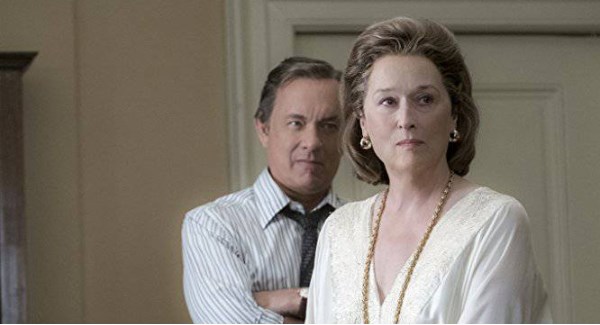Underrated in the manner of so many Steven Spielberg historical dramas, “The Post” is a journalism thriller that doubles as a stealth portrait of the media’s responsibility in the age of Trump, and in any age. Spielberg constantly does this sort of thing: he makes a movie about the past, or a science-fiction movie about the future, and it turns out to be a coded commentary on the present, but done in such an accessible and largely invisible style that many critics assume that they’re supposed to take everything literally, and start fact-checking every historical event (or every “plot hole” in the fantasy), then accuse Spielberg of being “middlebrow” and telling a story everyone already knows. It happens again here with Spielberg’s adaptation of a screenplay by Liz Hannah and Josh Singer about the 1971 decision of The Washington Post to defy the Nixon Administration and publish the Pentagon Papers, a set of documents reproduced by Rand Corporation employee Daniel Ellsberg (Matthew Rhys) proving that the U.S. intervention in Vietnam was doomed for a long time and the Johnson Administration knew it.
Meryl Streep plays Katherine Graham, the first female publisher of a major American daily newspaper, iconically played under another name by Nancy Marchand on “Lou Grant.” Tom Hanks plays executive editor Ben Bradlee, previously played by Jason Robards in “All the President’s Men.” The knockout supporting cast includes Sarah Paulson, Bob Odenkirk, Tracy Letts, Carrie Coon, and Alison Brie, and the story is procedural in nature—and not just in terms of the machinations needed to acquire the documents, affirm their veracity, and convince everyone at the company that publishing them is the right thing to do. The film is also a procedural in that it is concerned with the process of publishing a major story in a daily newspaper in the middle of the 20th century. Fans of newspaper movies (and really, anyone who has worked in journalism) will appreciate the scrupulous attention to detail, down to the operation of the press room, the way that different drafts of the story are borne through the office by copy boys, and the arguments over constitutional law as it applies to prior restraint and classified information. At a press screening I attended, there was applause after the moment when the final draft of the Pentagon Papers story is placed on a copy editor’s desk and she immediately starts crossing out unnecessary words.
Spielberg is probably the only surviving master of old-school Hollywood filmmaking who can gracefully convey power relationships through camera angles and the configuration of actors in relation to the lens without making a big deal of it. Look at the shot where Graham and Bradlee meet for the first time in the press club: the camera holds on them sitting at the table together for the majority of the scene. Ostentatious tracking shots that other directors would make the centerpiece of a campaign for a Best Director Oscar are routinely bested here by Spielberg, often in functional scenes that you don’t think of as being brilliantly executed, because you’re too busy paying attention to what the characters are saying; nevertheless, you absorb the filmmaking subconsciously and it fortifies everything else. That’s filmmaking. That’s Spielberg.
Graham often the focal point of Spielberg’s masterful illustration of spatial dynamics, because she’s usually the only woman in a room full of men and is keenly aware of this fact. As she grows more confident and decisive, she visually as well as figuratively becomes the center of gravity in her scenes, with the other performers seeming to orbit around her, as if drawn to the magnetic force of her rightness. It’s ultimately Graham’s movie, because she comes into it feeling intimidated, having inherited a business that is part of a heavily male-dominated industry. Her ultimate decision to order the publication of Ellsberg’s papers is an affirmation that she is truly the captain of the ship, and has seized control not through clever or treacherous maneuvering, but by having principles and great instincts.
Beyond the film’s success as a professional and personal drama set in an earlier time, “The Post” is a warning to audiences, journalists particularly, of the dangers they face in the era of Trump. We’re living in a post-truth environment, and it is incumbent upon the media to be truly fearless. But as “The Post” observes, this is made more complicated by the fact that the people who own media organizations tend to be wealthy and powerful, and tend to run in the same circles as inflluential politicians and military officials. The screenplay makes much of the coziness between Graham, Bradlee, other newspaper executives (including at The New York Times) and the power brokers they all cover. The question of whether the Pentagon Papers are going to mess up the paper’s society coverage (including Tricia Nixon’s wedding) is a topic of comic distress.
At the time of this movie’s release, there was quite a bit of grumbling that it celebrated an old and now dying set of neoliberal institutions and relationships, but in order to make this argument you have to ignore every observation that the screenplay goes out of its way to make, underlining in boldface at certain points just to make sure people get it, even though some of them never will. Regardless of whether the news is printed on paper or covered online, on television, in a podcast, or in some other form not yet devised, it is precisely this coziness and false intimacy between journalist and subject that poses the greatest danger to citizens.












